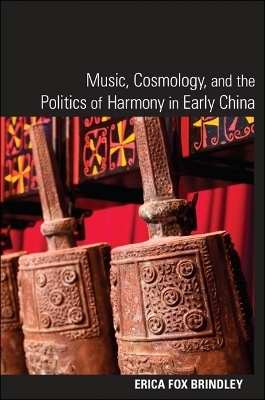
Music, Cosmology, and the Politics of Harmony in Early China
Seiten
2013
State University of New York Press (Verlag)
978-1-4384-4314-0 (ISBN)
State University of New York Press (Verlag)
978-1-4384-4314-0 (ISBN)
Explores the religious, political, and cultural significance attributed to music in early China.
Winner of the 2013 Reading Committee Accolade for a Specialist Publication in the Humanities presented by the International Convention of Asia Scholars
In early China, conceptions of music became important culturally and politically. This fascinating book examines a wide range of texts and discourse on music during this period (ca. 500–100 BCE) in light of the rise of religious, protoscientific beliefs on the intrinsic harmony of the cosmos. By tracking how music began to take on cosmic and religious significance, Erica Fox Brindley shows how music was used as a tool for such enterprises as state unification and cultural imperialism. She also outlines how musical discourse accompanied the growth of an explicit psychology of the emotions, served as a fundamental medium for spiritual attunement with the cosmos, and was thought to have utility and potency in medicine. While discussions of music in state ritual or as an aesthetic and cultural practice abound, this book is unique in linking music to religious belief and demonstrating its convergences with key religious, political, and intellectual transformations in early China.
Winner of the 2013 Reading Committee Accolade for a Specialist Publication in the Humanities presented by the International Convention of Asia Scholars
In early China, conceptions of music became important culturally and politically. This fascinating book examines a wide range of texts and discourse on music during this period (ca. 500–100 BCE) in light of the rise of religious, protoscientific beliefs on the intrinsic harmony of the cosmos. By tracking how music began to take on cosmic and religious significance, Erica Fox Brindley shows how music was used as a tool for such enterprises as state unification and cultural imperialism. She also outlines how musical discourse accompanied the growth of an explicit psychology of the emotions, served as a fundamental medium for spiritual attunement with the cosmos, and was thought to have utility and potency in medicine. While discussions of music in state ritual or as an aesthetic and cultural practice abound, this book is unique in linking music to religious belief and demonstrating its convergences with key religious, political, and intellectual transformations in early China.
Erica Fox Brindley is Associate Professor of History, Asian Studies, and Religious Studies at the Pennsylvania State University. She is the author of Individualism in Early China: Human Agency and the Self in Thought and Politics.
Acknowledgments
Prologue
Introduction: Music and Cosmological Theory
Part One: Music and the State
1. Music in State Order and Cosmic Rulership
2. A Civilizing Force for Imperial Rule
3. Regulating Sound and the Cosmos
Part Two: Music and the Individual
4. Music and the Emergence of a Psychology of the Emotions
5. Sagely Attunement to the Cosmos
6. Music and Medicine
Conclusion
Bibliography
| Erscheint lt. Verlag | 2.7.2013 |
|---|---|
| Reihe/Serie | SUNY series in Chinese Philosophy and Culture |
| Zusatzinfo | Total Illustrations: 0 |
| Verlagsort | Albany, NY |
| Sprache | englisch |
| Maße | 152 x 229 mm |
| Gewicht | 336 g |
| Themenwelt | Kunst / Musik / Theater ► Musik |
| Geisteswissenschaften ► Geschichte ► Regional- / Ländergeschichte | |
| Geisteswissenschaften ► Religion / Theologie ► Buddhismus | |
| ISBN-10 | 1-4384-4314-5 / 1438443145 |
| ISBN-13 | 978-1-4384-4314-0 / 9781438443140 |
| Zustand | Neuware |
| Haben Sie eine Frage zum Produkt? |
Mehr entdecken
aus dem Bereich
aus dem Bereich
Erinnerungen
Buch | Softcover (2024)
Pantheon (Verlag)
CHF 22,40
Universalgelehrter, Polarreisender, Entdecker
Buch | Hardcover (2024)
mareverlag
CHF 39,20


